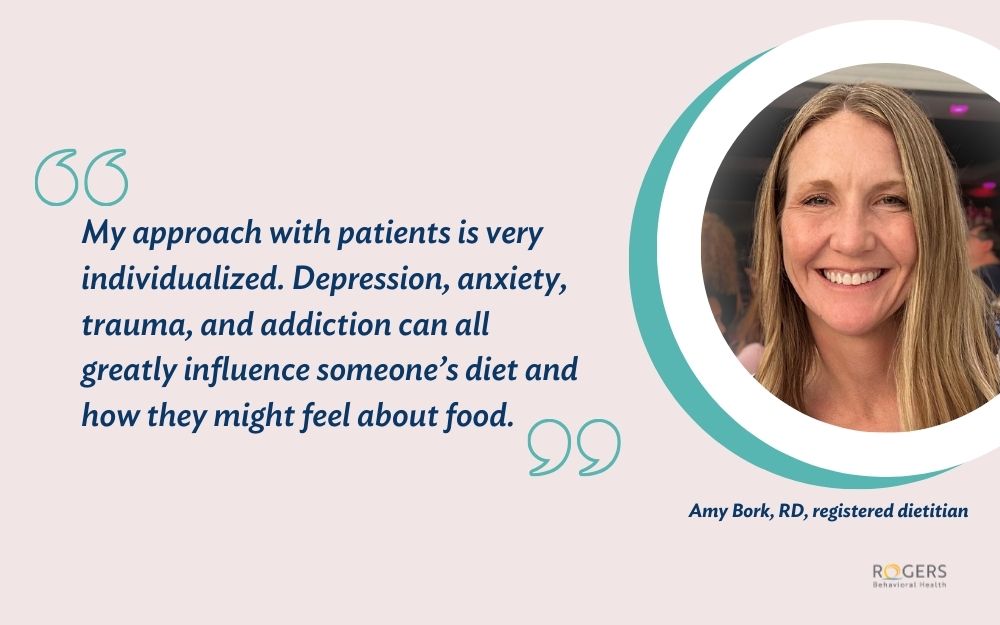By Amy Bork, RD, registered dietitian, Oconomowoc
March is National Nutrition Month. Sponsored annually by the Academy of Nutrition and Dietetics, this month focuses attention on the importance of making informed food choices and developing sound eating and physical activity habits. Recognizing the link between nutrition and mental health, Rogers has dozens of dietitians across the country focusing on all areas of mental health challenges, not just eating disorders.
How can nutrition impact mental health and wellbeing?
Studies have shown that including more healthy fats, fiber, whole grains, fruits and vegetables, in addition to adequate Vitamin D, can positively impact mental health and reduce symptoms of depression. Additionally, they can lower inflammation and alter neurotransmitters to lessen symptoms of depression.
In industry research, the gut-brain connection indicates that a diet consisting of nutrient dense foods may impact depression and anxiety through changes in the gut microbiome, or microorganisms, allowing for improved regulation of our mood and emotions. As part of many lifestyle changes like moderate activity, adequate sleep, and not smoking, nutrition has the potential to improve overall mental and psychological health. I want to caution that changing what you eat is not the answer for severe mental health challenges. Rather, a combination of nutrition, treatment, medication, movement, and other therapies is most effective.
How do you work with patients on nutrition?
I currently work within two of our adult residential programs —Trauma Recovery and Focus Depression Recovery. My approach with patients is very individualized. Depression, anxiety, trauma, and addiction can all greatly influence someone’s diet and how they might feel about food. For example, someone struggling with depression may not have the energy or motivation to put toward eating, or they might find themselves eating certain foods to alleviate poor mood. Anxiety may interfere with recognizing hunger cues and lead to poor intake or loss of appetite. Some may turn to food as a way to distract or cope with difficult emotions. When I meet with patients, I try to gain an understanding of how they approach food, and we work together toward goals of normalized eating.
When discussing nutrition as part of a patient’s treatment goals, I look at their eating patterns in addition to nutritional quality or type of foods consumed. Treatment goals could include specific food, nutrient or fluid recommendations, nutritional supplementation, incorporating new or unfamiliar foods, creating structure for meals and snacks, or strategies to manage eating behaviors. I think it’s important to set realistic goals when it comes to making these food and nutrition-related changes, so I always incorporate a patient’s objectives. We work together to create a nutrition plan for treatment. I often collaborate with other members of the treatment team to establish and carry out nutrition plans so we can best support our patients.
What nutrition improvements can someone make?
I recommend making gradual changes to diet and eating patterns. Oftentimes with diet, we want to make changes all at once, but setting weekly or monthly goals can be helpful when including more nutrient dense foods and adopting eating patterns that can be maintained long term. Many people fall short on eating healthy fats and fiber, so that can be a great place to start. For example, aim to include fish twice a week or five fruits and vegetables a day.
How Rogers can help
If you or a loved one is struggling with addiction, an eating disorder, depression or other mood disorder, OCD and anxiety, or trauma (PTSD), our compassionate teams are here to help. Call 800-767-4411 for a free, confidential screening.


